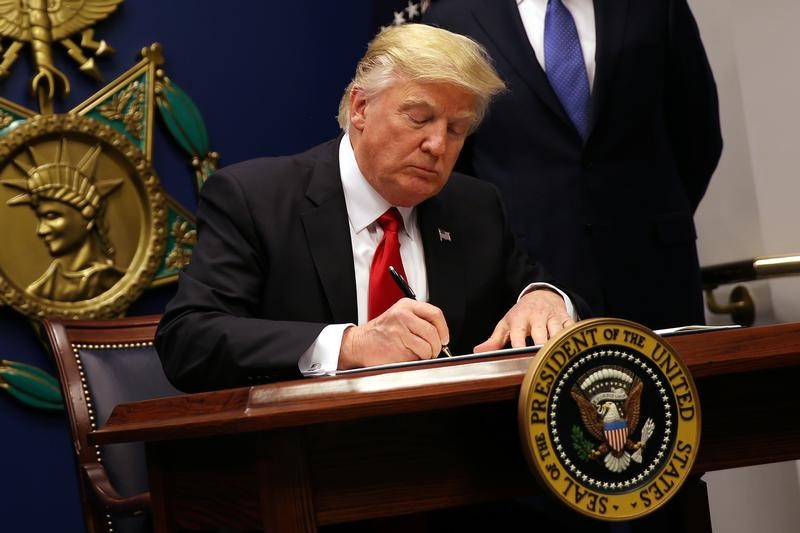(Bloomberg) -- President Donald Trump could exempt some nations when he formalizes tariffs on imported steel and aluminum amid threats of retaliation from U.S. trading partners and warnings from his own party that the move will hurt American businesses and consumers.
The administration will initially exclude Canada and Mexico from the tariffs, an exemption they would lose if they can’t agree to an updated North American Free Trade Agreement with the U.S., White House trade adviser Peter Navarro said on Wednesday. Other American allies could use a similar system to ask for an exemption, he said.
If Nafta talks fail, Canada and Mexico would face the same tariffs as other nations, Navarro added.
While the order to establish the tariffs was earlier expected to be signed Thursday, a person familiar with the planning said it would likely be pushed back to allow more time to prepare the legal documents. The White House schedule for Thursday did not list a tariff announcement.
The decision-making process regarding the tariffs has evolved and more changes could be made before the president formally approves them.
Other nations have threatened reprisals, and tensions are escalating. On Thursday, China’s foreign minister, Wang Yi, vowed a “justified and necessary response” to any efforts to incite a trade war. It was the Chinese government’s most forcible response yet to the new tariffs.
Wang, who spoke on the sidelines of the National People’s Congress in Beijing, urged the U.S. to work with China on a mutually beneficial solution.
“A trade war has never been the right way to solve the problem, especially under globalization,” Wang said. Such a conflict “will only harm everyone and China will surely make a justified and necessary response.”
Exemption or Retaliation
Canada, the biggest supplier of steel and aluminum to the U.S., and No. 4 steel-provider Mexico have asked to be exempted, and both have indicated they’ll retaliate if Trump includes them in the duties.
The U.S. may exempt countries from the duties based on national security considerations, White House Press Secretary Sarah Huckabee Sanders said Wednesday. She didn’t comment on how those determinations would be made and or which countries would qualify.
“There are potential carve-outs for Canada and Mexico based on national security and possibly other countries as well,” Sanders told reporters at the White House. “That would be a case-by-case and country-by-country basis.”
Negotiators from the U.S., Canada and Mexico wrapped up the seventh round of Nafta talks this week in Mexico still hoping for a breakthrough on the biggest sticking points. The president hinted at the tariff incentive in a tweet earlier this week, without elaborating on how the trade-off would work.
Trump has said he’s determined to impose a 25 percent tariff on steel imports and 10 percent on aluminum to protect national security. The plan has been widely criticized by Republicans, panned by corporate America, shaken global financial markets, and prompted the resignation of Trump’s top economic adviser, Gary Cohn, this week.
Intensifying Concern
More than 100 House Republicans, led by Ways and Means Committee Chairman Kevin Brady, urged Trump on Wednesday to reconsider broad tariffs, warning that they would cost American jobs, raise prices for consumers and hurt domestic manufacturing.
Adding to the wave of criticism, the head of the U.S. Chamber of Commerce Thomas Donohue said his organization was very concerned about the potential for retaliation and a trade war.
The European Union has warned it would respond with its own 25 percent tariff to hit $3.5 billion of American goods. The bloc is targeting iconic U.S. brands produced in key Republican states on a range of consumer, agricultural and steel products, according to a list drawn up by the European Commission.
Trump announced the planned tariffs on March 1, after a Commerce Department investigation found that imports of the metals pose a risk to national security. The probes were authorized under the seldom-used Section 232 of the 1962 Trade Expansion Act, that gives the president broad powers to impose trade restrictions on domestic security grounds.
Under the Section 232 rules, Trump has until April 11 to make a decision on steel and April 19 on aluminum.
